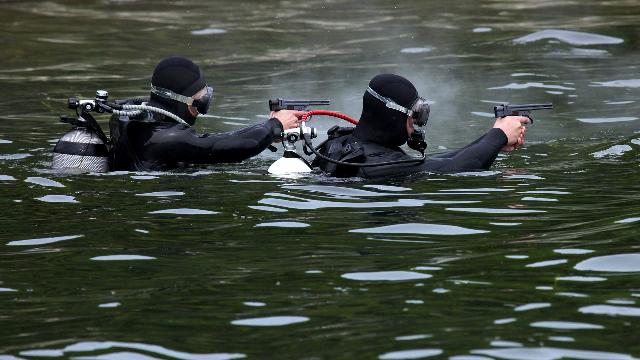UAVs will strengthen the protection of naval bases, ships and important coastal infrastructure
To special detachments of counteraction to sabotage forces and means (PDSS) The Russian Navy has received unmanned aerial vehicles. They can be used to detect and destroy enemy sabotage forces underwater and on shore. The Pacific Fleet has already conducted exercises to practice enemy search tactics — during them, UAVs were involved in groups along with high-speed boats. Experts note that in the current military-political situation, the fleet must be prepared for any unfriendly actions and UAVs will seriously expand the capabilities of our anti-sabotage forces.
Drones will strengthen anti-sabotage forces
Unmanned aerial vehicles are already being used by detachments of the PDSS of the Russian Navy to control the water area and patrol likely routes of saboteurs in coastal areas. In particular, in the area of Avacha Bay, combat swimmers of the Pacific Fleet conducted exercises using them, sources told Izvestia in the Ministry of Defense of the Russian Federation.
The interlocutors of the publication noted that more than 60 military personnel participated in them, three anti-sabotage boats and four high-speed boats were involved.
The actions of the PDSS units are not advertised, but they are of great importance. The death of a large warship is a serious moral and material blow for any country, military expert Dmitry Boltenkov told Izvestia.
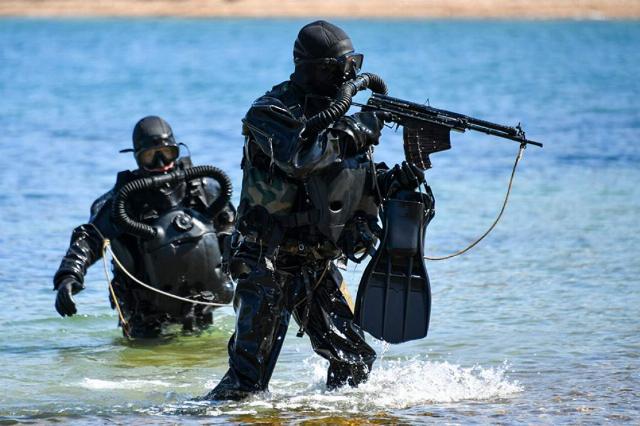
Photo: TASS/Yuri Smityuk
Image source: iz.ru
"In the current military—political situation, we need to be ready for any diversions," he said. — Including the non-standard actions of the enemy. Sea swimmers can be sent to the port from aboard a neutral cargo ship. They can come to Crimea or Kamchatka as tourists. And in this case, it is necessary to monitor not only the water area. Somewhere on the shore, the saboteurs will need to equip caches for explosives and equipment. Therefore, the PDSS units will need to control large coastal areas around naval bases, from where a sortie can be made.
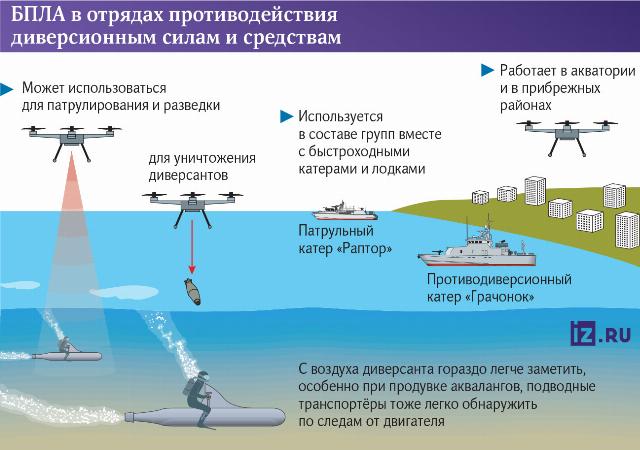
Drones are well suited for the destruction of marine saboteurs in coastal waters, he noted.
— The underwater swimmer can be seen much better from the air. — the expert explained. — They will also be easier to spot when purging scuba gear. Underwater transporters, which can be used by the enemy, are also easy to detect from the air, for example, by the traces left by a working propulsion system.
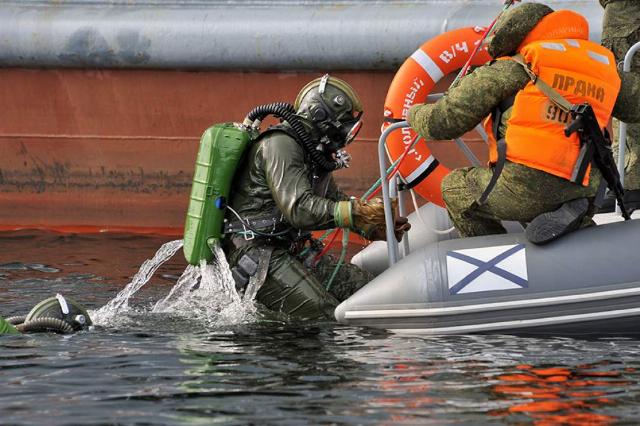
Photo: TASS/Lev Fedoseev
Image source: iz.ru
The possibility of dropping grenades on naval saboteurs from UAVs is a cheap and effective way to deal with them, Dmitry Boltenkov noted.
— In the best case for him, he will just float up, but most likely he will drown — the hydrodynamic impact from the grenade explosion seriously affects people under water, — Boltenkov noted.
Protection of naval bases
To protect the naval base, a layered defense is needed, Dmitry Boltenkov also said.
— The PDSS swimmers themselves, as a rule, operate on speedboats, — he reminded. — "Rooks" are often used for these purposes. They have a sonar station for detecting underwater objects, anti-sabotage grenade launchers for shooting at swimmers. Now they will have new opportunities.
UAVs will seriously facilitate the service of our combat swimmers, military expert Captain I rank Vasily Dandykin told Izvestia.
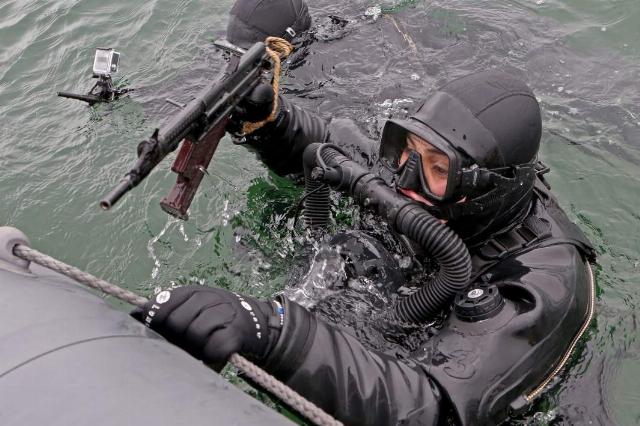
Photo: RIA Novosti/Igor Zarembo
Image source: iz.ru
— Drones will allow reconnaissance, which will once again allow swimmers not to move to certain areas on boats, — he noted. — The possibility of dropping ammunition will allow you to destroy the enemy from a distance without endangering the lives of our guys.
The expert noted that this area will only develop.
— At one time, to protect the ships, we carried out preventive grenade throwing — we threw grenades into the water at certain intervals so that the saboteurs surfaced, — he noted. — This method is still effective, but new technologies are emerging and they need to be used. In the future, drones will receive more powerful weapons, including anti-submarine ones, and will be able to find not only saboteurs, but also mine installations. The emergence of new weapons systems in this area is inevitable.
Who serves in the PDSS
Currently, Russian naval bases and the coast are protected by several detachments to counter sabotage forces and means, which are part of four fleets, as well as the Caspian Military Flotilla. The PDSS fighters are also responsible for the protection of the logistics point in the Syrian Tartus.
The PDSS units are formed from military contractors. A combat swimmer is trained to fight not only at sea, but also on land.
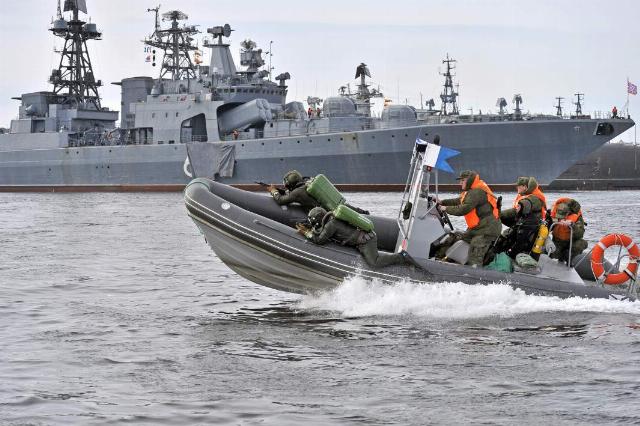
Photo: TASS/Lev Fedoseev
Image source: iz.ru
All fighters who have joined the PDSS detachment master a complex training program, including navigation and topographic, diving, assault, parachute, and even mountain training, learn hand-to-hand combat and radio engineering. They can counteract underwater saboteurs threatening naval bases, warships, important infrastructure coastal structures, as well as military towns.
Combat swimmers are often seconded to detachments of ships of the Russian Navy to ensure their safety during long-distance hikes and when staying in ports of foreign countries.
The PDSS detachments receive high—speed boats and boats, including Raptors and Rooks.
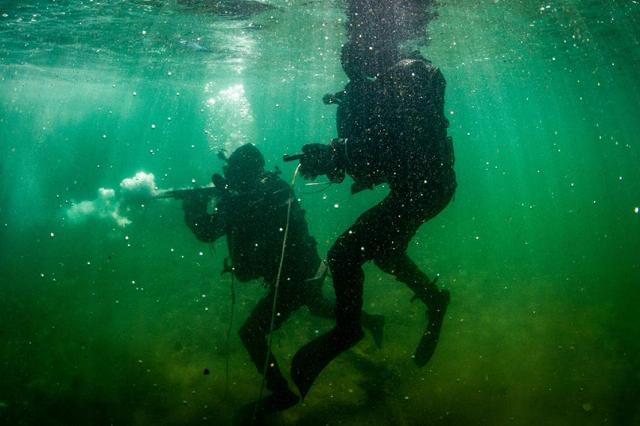
Photo: TASS/Yuri Smityuk
Image source: iz.ru
A special small automatic weapon has been developed for them, designed for use not only on land, but also underwater. They are armed with two-medium automatic APS, ADS and SPP-1 pistols. In addition, they are armed with a special anti-sabotage grenade launcher DP-61 "Duel" and a multi-barrel DP-65 to destroy saboteurs underwater. They also have in their arsenal means of detecting saboteurs, mining and clearing ships and structures.
Currently, the Russian Navy is taking measures to improve the protection of bases from all existing threats, including new ones. Earlier, Izvestia reported that anti-ship protection control points are being created in Russian naval bases. Of these, they will coordinate the repulse of attacks by air and sea drones.
Bogdan Stepovoy
Vladimir Matveev
